Repair of Aneng AN8009 meter - erroneous ohmmeter readings
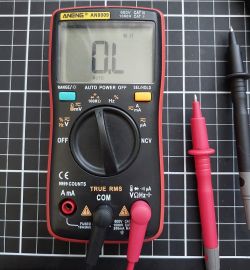 .
.
Welcome,
Today I will give a description of a simple repair of this multimeter. The equipment is popular enough that maybe someone less familiar with the subject will find this description useful and save his instrument
The meter on the ohmmeter range indicated all sorts of silly things, e.g. a 100 ohm resistor was identified as being up to several tens of kiloohms. Without the probes plugged in, it was also able to display some nonsense, and when the probes were short-circuited, instead of zero the display could show several hundred ohms or even more.
The first suspects were the batteries. I bought the meter in the first half of 2021 and it has been running on the same set of batteries ever since, and I use it the most out of all the meters I own. However, the cells turned out to be in pretty good shape, I even swapped them for new ones just to be sure, but it didn't do anything.
What I observed later, normal readings could be restored (but not always) by switching between ranges a few times. So the main suspect became the switch. To get to it the meter has to be disassembled, after dismantling the casing and removing the board we have this view:
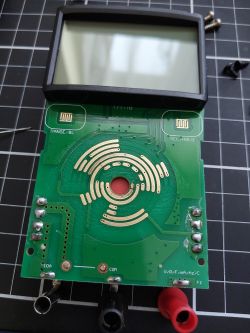 .
.
You can see the switch tracks, they appear to be gold plated.
If you look closely you can see the oily ooze on the board:
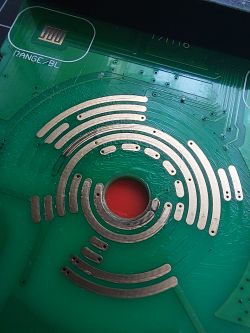
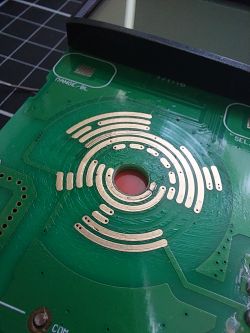 .
.
This is probably grease that leaked from the switch and got on the PCB.
The part with the knob on the underside:
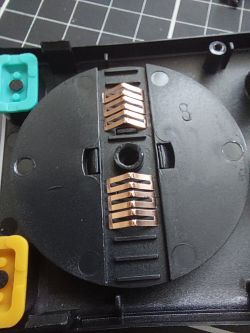 .
.
Here the contacts look OK, however I also washed them just in case.
The switch tracks after cleaning:
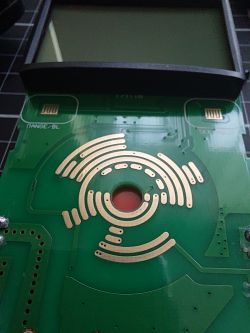 .
.
You can see a huge difference, clean was not there:
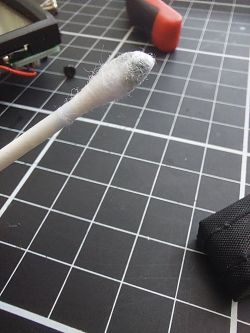 .
.
Taking advantage of the fact that I had the meter open I also replaced the original 100uF electrolyte on the meter supply with a 1000uF:
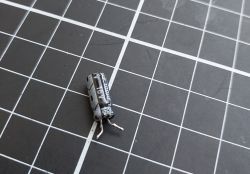
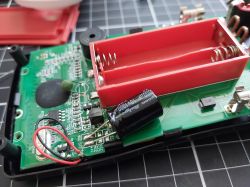 .
.
This is one of the recommended modifications for this meter, you can read more here: https://www.elektroda.pl/rtvforum/topic3713925.html#18825243
Well, and now the most important thing: Was the repair successful, does the meter indicate as it should? Time to check!
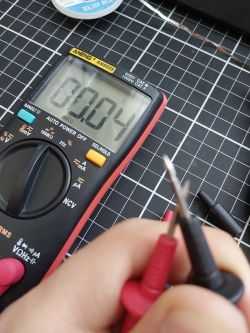 .
.
It worked and the readings returned to correct
The whole repair took me ~ half an hour, cost 0zł
The switch, by the way, is a common problem with many meters, mainly because the power switch is usually placed there as well, so the switch wears out faster because of this.
Thank you for your attention.
Regards,
A.



Comments
This grease is probably silicone grease, which is used to lubricate the contact area so that the contacts do not degrade quickly, due to the poor quality of the pcb and copper plating, so I would suggest... [Read more]
. Well in this case it was making it worse. The ohmmeter was going crazy before and now it works normally, so I guess there was something not quite right with the grease? Greetings, A. [Read more]
I don't think the grease itself is the problem, I've usually seen clear grease used for such purposes, its purpose is rather to reduce friction, mechanical wear of the contacts/PCB. Here on the PCB you... [Read more]
. Basically such a grease, in this case probably silicone, is an insulator. If it gets between the contacts of the switch and the copper fields on the PCB then things like this can happen. Well, and... [Read more]
. With good contact pressure, this grease is not an insulator, and actually contributes to prolonging the life of the switch. Unless I am mistaken and the instrument was designed by a Chinese idiot. [Read more]
The grease should be the problem is the switch in the dial instead of a separate separate button. [Read more]
To dispel doubts I looked at another meter - UNI-T UT33D+, the grease is: https://obrazki.elektroda.pl/7145117300_1725178412_thumb.jpg https://obrazki.elektroda.pl/7967320000_1725178412_thumb.jpg... [Read more]
You can always use it without grease for a test and see what condition the tracks are in after a year. [Read more]
In my case the problem was the banana sockets. I have solid, proprietary wires, 1.5mm2 in silicone, 'gold-plated' plugs. On a DT-9935 bridge, they had a resistance of 0.1 R. Meanwhile, Aneng, (shorted),... [Read more]
I also recently cleaned my old multimeter, it works perfectly, but I have a dilemma whether to give silicone grease to those switch contacts or better to give non-acid technical petroleum jelly? Or maybe... [Read more]
This will neither help nor harm you. A crappy switch won't fix it, and a decent one won't hurt you either. [Read more]
For multimeters I have not used it but for switches it is ideal. I have rescued old isostats and decade/BCD switches with it, among others. Only for flat switches you would have to give a thin layer so... [Read more]
This is probably unsuitable since from the description it appears to conduct electricity. It will make "shorts" or leakage between the tracks on the switch board. [Read more]
. Well I had that in the 10/BCD rotary switches, because there is just such a circular plate etched into the laminate and microsteps. When I gave too much, it actually made short circuits. But when I... [Read more]
. The wires as well as the sockets in this case are OK. Although I have some Chinese meter where the wires themselves have 5 ohms :) . . Maybe that would be a good solution. Or Contact 61. ... [Read more]
the link to the modification topic provided also contained a solution to your problem at the end. I had a similar problem a year ago. A year after cleaning and applying new grease, the multimeter works... [Read more]
. I also have this suspicion that there is something wrong with the factory one. I will probably buy the correct one unless Fellows can advise something else. Regards, A. [Read more]
And brag about what you cleaned so beautifully with? Chemistry or just a decent stick? [Read more]
. IPA :) . Regards, A. [Read more]